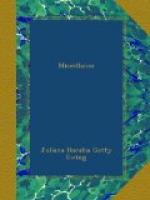to say nothing of the ladies’ yellow leather
boots. A tobacconist’s shop with us is
interesting to none but smokers, but Turkish pipes
have stems several feet long, made of various kinds
of wood, and these and the amber mouth-pieces, which
are often of very great value, and enriched with jewels,
make the pipe-seller’s wares ornamental as well
as useful. Nor can our gunsmiths’ shops
compete for picturesqueness with the Bazaar devoted
to arms, of all sorts and kinds, elaborately mounted,
decorated, sheathed, and jewelled. Turkey and
Persian carpets and rugs are common enough in England
now, and you know how handsome they are. Turbans,
and even fezes, you will allow to look prettier than
English hats. Then some of the shops display things
that one does not see at all at home, such as the
glass lamps for hanging in the mosques and Greek churches.
Nor is it the things for sale alone which make the
Bazaar so wonderful a sight. The buyers and sellers
are at least as picturesque as what they sell and
buy. The floor of each shop is raised two or
three feet from the ground, and on a gay rug the turbaned
Turk who keeps it sits cross-legged and smokes his
pipe and makes his bargains, whilst down the narrow
street (which in many instances is arched overhead
with stone) there struggle, and swarm, and scream,
and fight, black slaves, obstinate camels, primitive-looking
chariots full of Turkish ladies, people of all colours
in all costumes, and from every part of the world.”
“It must be a wonderful place,” sighed
Maggie; “streets full of beautiful shoes, and
streets full of beautiful carpets.”
“Just so, Maggie.”
“Not at all like a London Bazaar, then.
I thought perhaps it was a place that shut up to itself,
with a beadle sitting at the door?”
“I never was in Stamboul at night, but my belief
is that the Bazaar is secured at night by the locking
up of gates. You know the people who own the
shops do not live in them, and as most valuable merchandise
remains in the Bazaar, it must be protected in some
way. I suppose the watchmen look after it.”
“Have the Turks watchmen like the old London
watchmen, Cousin? With nightcaps, and rattles,
and lanterns, and big coats?”
“The Turkish watchmen wear turbans—not
nightcaps; but they have lanterns and big coats, and
in one respect they are remarkably like the old ‘Charlies,’
as the London watchmen used to be called. Their
object is not (like policemen) to find robbers and
misdoers, but to frighten them away. Just as
the old Charlies used to spring their wooden rattles
that the thieves might get out of their way, so the
Turkish watchman strikes the ground with an iron-shod
staff, that makes a great noise, for the same purpose.
In one respect, however, the Turkish watchmen are
most useful—they give warning of fires.”
“Are there often fires in Constantinople?”




